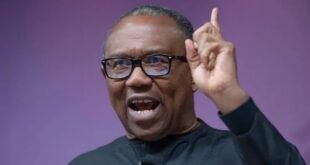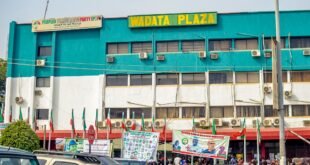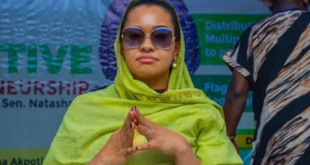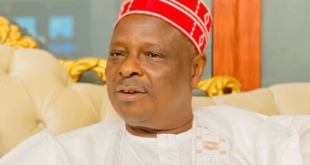President Bola Tinubu, in his speech at the United Nations Wednesday morning, called for debt forgiveness for developing countries from creditors and multilateral financial institutions.
Tinubu, represented by Vice President Kashim Shettima, made the request at the ongoing 79th United Nations General Assembly (UNGA) in New York, United States.
He called for the return of proceeds of corruption and illicit financial flows from developing countries.
He reminded the Assembly that returning such funds to the countries of origin was a basic principle of the United Nations Convention against Corruption.
He also urged the Assembly to take collective action against hunger, terrorism, climate change and other global challenges.
He urged world leaders to recommit to multilateralism by deepening ties among United Nations (UN) member states in accordance with the principles of inclusiveness, equality and cooperation.
He said: “Similarly, we must ensure that any reform of the international financial system includes comprehensive debt relief measures, to enable sustainable development financing. Countries in the global south cannot make meaningful economic progress without special concessions and a review of their current debt burdens.
“The international community must take practical steps to strengthen international cooperation to recover and return stolen assets and eradicate safe havens that facilitate the flow of illicit funds from developing to developed countries.”
Tinubu expressed concerns about the UN’s core purpose and how it can maintain the global body’s relevance and resilience, noting that the organization’s pillars are at risk of being destroyed along with the principles of inclusivity, equality and cooperation it stands for.
“Today, the pillars of our organization are under threat. They are at risk of being broken by the relentless pursuit of individual national priorities, rather than the collective needs of the nations gathered here today.
“While a commitment to multilateralism offers us the surest guarantee of global action to address the existential challenges we face, singularity and nationalism undermine aspirations for peaceful and collective resolution of those challenges.
“From last year’s summit, and also from previous years, we have overcome the challenges of terrorism, armed conflict, inequality, poverty, racial discrimination, human rights violations, food crises, hunger, illegal migration, piracy, global pandemics, hyperinflation, nuclear proliferation, heavy debt burdens, climate change, and a myriad of other issues.
“These ongoing challenges prove our failures, not our great achievements. Billions of dollars are poured into waging wars and fanning the flames of conflict,” he said.
Tinubu assured that “Nigeria’s steadfast commitment to deepening multilateralism, as it did 65 years ago when it joined the United Nations as its 99th Member State.
He said: “We remain committed to the “desire to remain friendly with all countries and to participate actively in the work of the United Nations”, as expressed by our founding Prime Minister, Sir Abubakar Tafawa Balewa.”
He condemned the return of unconstitutional changes of government and forceful military coups in several African countries.
He noted that the coup demonstrated how fragile democracy is if it is not supported by economic development and sustainable peace and security.
He said: “Our people need jobs. They need a decent living. They want good, affordable education and healthcare for their children and families. They need to live in a healthy, safe and secure environment. They need hope and opportunity.”
The President also called for reforms in the international financial architecture and a transparent multilateral trading system, and expressed the hope that “the adoption of the “Pact for the Future” will change the narrative, reposition the economy, and translate it into concrete steps that provide solutions to the challenges faced by developing and least developed countries.
He said: “For these and other reasons, we reiterate the call for countries, especially in the global south, to reform the international financial architecture and promote a rules-based, non-discriminatory, open, fair, inclusive, equitable and transparent multilateral trading system.”
However, he drew the UN’s attention to the global debt burden that undermines the ability of countries and governments to meet the needs of their citizens, trade barriers and protectionist policies that crush the hopes of countries, and uncontrolled competition that saps motivation and discourages global investment.
ALSO READ: HURIWA slams Tinubu over ‘no free beer’ response to Nigeria’s plight
Speaking on insecurity, he noted that the threat was plunging citizens into untold hardship and misery, and pointed out that it was affecting people’s confidence in democracy.
He added that restoring confidence in democratic governance and the constitutional order was the duty of the international community.
“We cannot build a resilient society with the ever-growing menace of terrorism, banditry and insurgency in our country and region. Indeed, violent extremism remains an existential threat to national and international peace, security and development. We are making concerted efforts to contain and counter this menace,” he said.
Tinubu assured that “the African Counter-Terrorism Summit hosted by Nigeria in April 2024 and its outcome – the “Abuja Declaration” – promises to provide solutions to the challenges posed by terrorists and insurgents.”
He also warned of the dangers of climate change, describing it as a driver of insecurity that poses a real challenge to sustainable development, even as he recalled the devastating floods in Nigeria that submerged large parts of the country, “including one of our largest cities, Maiduguri, in the North East.”
He appealed to the international community to continue implementing the commitments made at various COP meetings.
He said failure to do so would be tantamount to delaying the inevitable, as no country is immune to the impacts of climate change.
The president, who stated that conflict prevention was the main reason for the creation of the UN, lamented that the task of conflict prevention had become difficult after the normalization of conflicts “when even condemnation of violence and civilian casualties, and calls for a ceasefire, were somehow considered controversial.”
He outlined some of the root causes of conflict, namely: poverty, hunger, ignorance, inequality and exclusion, as well as other forms of injustice, and also noted the conflict in Sudan and the war in Gaza and other Palestinian territories.
“This shows us that the international community has failed to live up to the spirit and aspirations of the United Nations to free the world from inequality, violence and the domination of one nation over another. Justice is the opposite of revenge,” he said.
Tinubu further stressed bold reforms in the UN Security Council with the aim of giving Nigeria and other African countries permanent seats on the council.
He stressed that since then it has become important for the UN to strengthen its relevance and credibility in a rapidly changing world.
He said: “Several permanent members of the United Nations Security Council have given encouraging, if tentative, indications of support for the issue of Council reform. We welcome this change in tone and urge accelerated momentum for the process.
“The Security Council must be expanded, in the categories of permanent and non-permanent members, to reflect the diversity and plurality of the world. We fully support Secretary-General Guterres’ efforts in this regard.
“Africa must be given the respect it deserves in the Security Council. Our continent deserves a place in the category of permanent members of the Security Council, with the same rights and responsibilities as other Permanent Members.”
UNGA 2024: Tinubu seeks debt forgiveness for developing countries first appeared on Latest Nigeria News | Headlines from Ripples Nigeria.
 JamzNG Latest News, Gist, Entertainment in Nigeria
JamzNG Latest News, Gist, Entertainment in Nigeria









